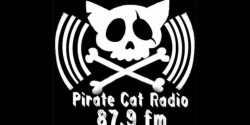Today the FCC released an order upholding a $10,000 fine against Dan Roberts, former manager of Pirate Cat Radio, for unlicensed broadcasting. The fine was originally issued in 2011.
Pirate Cat Radio began as an audacious and prominent unlicensed station operating out of a San Francisco cafe, headed up by charismatic leader Dan Roberts who went by the monikers “Monkey” or “Monkey Man.” As the heat from the FCC turned up, Pirate Cat ended actual FM transmission from its cafe studio, becoming an online-only station. However, a third party picked up the Pirate Cat stream and rebroadcast it on the station’s old FM frequency. It was this disassociation between Pirate Cat and the unlicensed FM broadcast that formed the basis for Roberts’ petition for reconsideration of the fine to the FCC.
In upholding the fine, the Commission rejected Roberts’ argument, along with his argument that there was no proof linking him to these broadcasts. The FCC’s reasoning for rejecting them, however, brings forward a novel argument that could threaten a common pirate broadcast strategy.
The Commission ruled that since Roberts presented himself as the manager of Pirate Cat, publicly acknowledged the unlicensed broadcast, and even solicited donations for the broadcasts on the Pirate Cat website, then he is responsible for them. The FCC relies on a 1948 ruling by the 5th Circuit Court of Appeals, Campbell v. US, which states, “the word ‘operate’ has been interpreted to mean ‘the general conduct or management of a station as a whole, as distinct from the specific technical work involved in the actual transmission of signals.”
I contacted both Roberts, via the Pirate Cat facebook page (an email to the site’s contact address bounced), and his attorney Michael Couzens today to ask for comment about the FCC’s order, and to ask if Roberts plans to mount further legal challenges. I did not hear back from them prior to publication, but will certainly post updates as we learn more.
Impact on Other Pirates
The broader impact of the Commission’s reasoning comes from the fact that that disassociating an unlicensed transmitter from a studio location is a tactic that has been used by some stations. The logic has been that the FCC can locate or seize transmitters without imperiling DJs and other station staff. There have also been cases where online community stations have been rebroadcast by third parties without public association, specifically in order to buffer the station from the possible consequences of unlicensed operation.
The FCC’s ruling against Pirate Cat would appear to erode the value of this tactic. While it does indicate that the Commission will not go for the defense in the case of stations that once hosted their own transmitters, the ruling’s interpretation is narrow enough to provide guidance to would be pirates considering this method.
One of the things that made Pirate Cat and Daniel Roberts unique was their willingness to be out in the open, seeking publicity, rather than running a more clandestine operation. Unsurprisingly, that also provided the FCC with plenty of ammunition to go after Roberts, who was the very public face of Pirate Cat Radio.
Moreover, the station’s apparent embrace of the third party broadcast damaged Roberts’ plausible deniability. Though one might argue that the Commission’s interpretation of Campbell v. US is overly broad considering that there was no material evidence, it is likely it’s one that FCC staff believe has a decent chance of standing up in court, should Roberts wish mount a legal challenge.
For other unlicensed stations the advice is simple: you can’t have your cake and eat it, too. That is, if a station is going to separate its studio and transmitter, relying on an unassociated third party to operate the broadcast of an internet station, then it’s important to keep the two truly unassociated. Acknowledging the unlicensed signal, or fundraising for it on the internet station and its website might be used against it should the FCC come looking.
Pirate Cat Redux?
The Daniel Roberts led Pirate Cat Radio folded in 2011 when he took the station off-line leading to contention between him and the station’s staff and volunteers. The staff then launched the online-only Mutiny Radio in its place in June of that year.
All indications are that Roberts left the country after shutting down Pirate Cat. He had also taken over management of a LPFM community station in Pescadero, CA that had to reorganize after his abrupt departure.
Recently, it appears Pirate Cat has resurfaced online. A new Facebook page appeared last week, describing the station as, “Secret studios in San Franscisco, Los Angeles and Berlin featuring music, live bands, news and interviews.” The page mostly advertises concerts happening in Berlin.
A new website advertises “new DJs and shows” and broadcasts in Berlin “on random FM frequencies.” It appears that Roberts is still involved, since the site prominently features a picture of him. It also seems like he has learned from his FCC experience, since the site advises “We won’t tell you when and where,” the FM broadcast will be, “you’ll have to find us.”



